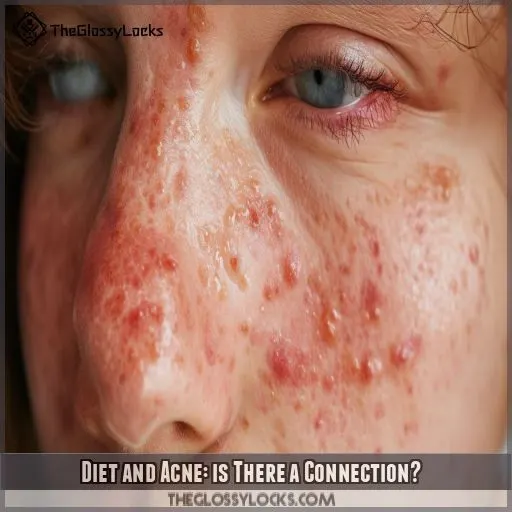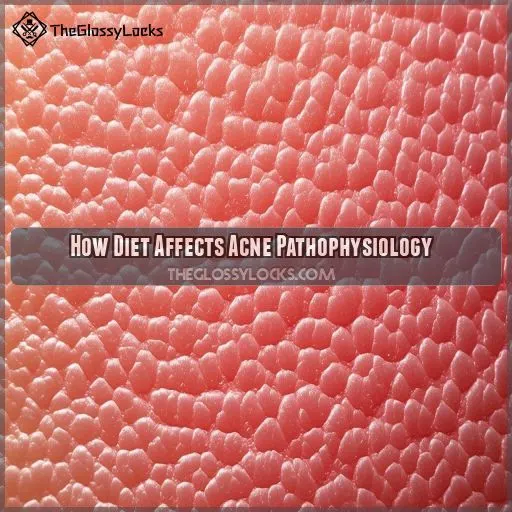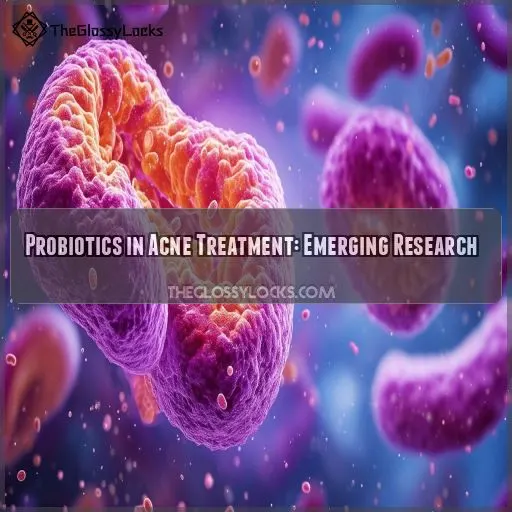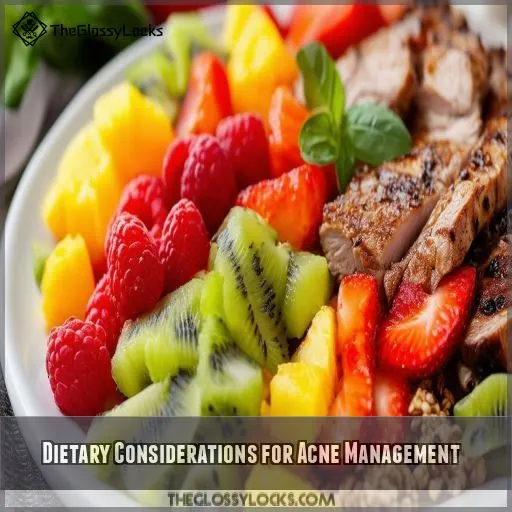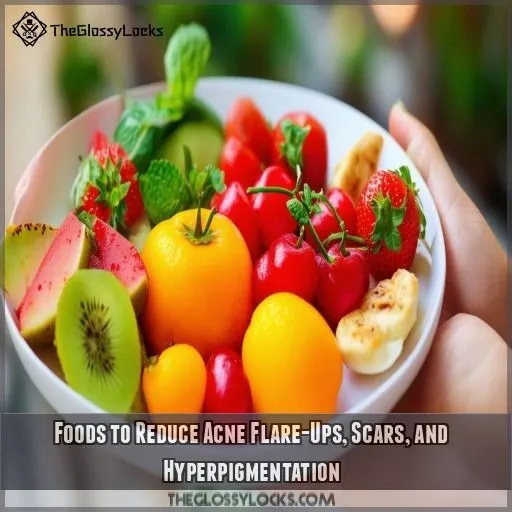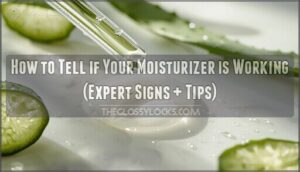This site is supported by our readers. We may earn a commission, at no cost to you, if you purchase through links.
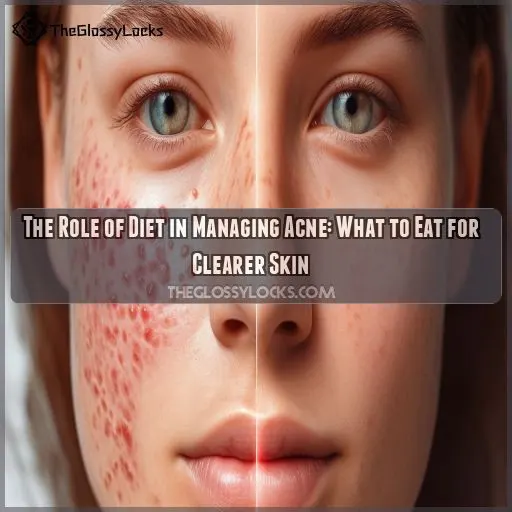
Keep reading to discover the specifiC foods that can help fight acne and promote clear skin.
Table Of Contents
- Key Takeaways
- Diet and Acne: is There a Connection?
- How Diet Affects Acne Pathophysiology
- Probiotics in Acne Treatment: Emerging Research
- Dietary Considerations for Acne Management
- Foods to Reduce Acne Flare-Ups, Scars, and Hyperpigmentation
- Frequently Asked Questions (FAQs)
- Does diet affect acne?
- What diet should I follow if I have acne?
- Which dietary habits are associated with acne?
- When did dietary advice become a standard part of acne therapy?
- How do you control a flare up of acne?
- Does diet play a role in hormonal acne?
- Does an anti-inflammatory diet help acne?
- What is the association between diet and acne severity?
- What foods prevent acne?
- Do probiotics treat acne?
- Does dairy cause acne?
- Which vitamins help acne?
- Does sugar make acne worse?
- Conclusion
Key Takeaways
- What you eat impacts your skin. The Western diet, loaded with processed foods and dairy, can trigger acne flare-ups.
- Dairy products, especially whey protein, are linked to acne development. Cutting down on dairy may improve skin conditions.
- Omega-3 fatty acids, found in fish and plant-based oils, are your skin’s best friend. They reduce inflammation and keep breakouts at bay.
- Probiotics are the new buzzword in acne treatment. While research is ongoing, early findings suggest they may complement conventional treatments by regulating gut health and reducing skin inflammation.
Diet and Acne: is There a Connection?
You’ve probably heard that eating greasy food or chocolate can give you pimples. But is there any truth to this? Can what you eat really impact your skin? Let’s find out if there’s a connection between diet and acne.
Dairy Products and Acne Development
You might’ve heard that dairy could be linked to acne.
But is it true? Well, it’s a bit complicated.
Studies suggest that dairy products, especially whey protein, may contribute to acne.
But it’s not just any dairy—it’s mostly cows’ milk that’s under the spotlight.
Omega-3 Fatty Acids and Their Beneficial Effects on Acne
While dairy may be a culprit, omega-3 fatty acids are your skin’s bestie. These healthy fats, found in fish and plant-based oils, are a powerful weapon against acne. How? They’re like a chill pill for your skin, calming inflammation and helping to keep those breakouts at bay.
The Impact of the Western Diet on Acne Prevalence
Turns out, the Western diet might be wreaking havoc on your skin. Populations with traditional diets, like the Inuit and Kitavan islanders, had super clear skin, but when they switched to a Western diet, their acne rates skyrocketed. So, what’s the deal? Well:
- The Western diet is loaded with processed foods, which are often high in sugar and refined carbs. These foods spike your insulin levels, leading to more oil production and clogged pores.
- Dairy is a big part of the Western diet, and it’s not doing your skin any favors. Milk and other dairy products can mess with your hormones, causing excess oil and inflammation.
- The Western diet tends to be low in anti-inflammatory foods like omega-3 fatty acids. Without enough of these skin-soothing nutrients, your acne might be sticking around longer than that ex you can’t stop stalking on Instagram.
How Diet Affects Acne Pathophysiology
Let’s dig into the nitty-gritty of how what you eat impacts your skin. We’ll explore the science behind how certain foods influence acne, from excess sebum production to inflammation.
Excess Sebum Production and Insulin Spikes
Let’s talk about how what you eat affects your skin on a deeper level. We’re going beyond the surface here, so buckle up!
First off, acne isn’t just about what’s happening on the outside; it’s linked to what’s going on inside your body, too. Think of it like a traffic jam causing chaos on your skin’s surface, with excess sebum production, bacterial overgrowth, and inflammation all piling up.
Now, here’s where diet comes in. Eating foods with a high glycemic index (GI) can lead to insulin spikes. This isn’t good news for your skin because these spikes can increase IGF-1 levels, which then tell your body to produce more sebum. So, those sugary treats mightn’t be worth the trouble they bring to your skin.
The Role of MTORC1 Signaling in Sebum Production
Dairy consumption is linked to acne. It’s believed that dairy activates mTORC1 signaling, which increases sebum production and keratinocyte proliferation, leading to clogged pores and acne breakouts. So, cutting down on dairy may help improve your skin.
Anti-Inflammatory Properties of Omega-3 Fatty Acids
Omega-3 fatty acids are well-known for their anti-inflammatory benefits, and they can work wonders for your skin health. Here’s how they can help you fight acne:
- Reduce inflammation associated with acne breakouts.
- Promote healthier skin by reducing redness and irritation.
- Help maintain a balanced skin pH, creating a less favorable environment for acne-causing bacteria.
- Support overall skin health and hydration, contributing to a glowing complexion.
- Provide essential nutrients that nourish your skin from within, promoting skin renewal and repair.
Probiotics and Gut Microbiota Regulation
The fascinating world of gut health and its impact on skin conditions like acne is an exciting frontier in healthcare. Probiotics, those friendly bacteria, are key players in this intricate relationship. Here’s how they work their magic:
| Keyword | Explanation | Impact on Acne |
|---|---|---|
| Gut Health | Probiotics promote a healthy balance of gut bacteria. | A balanced gut may reduce skin inflammation. |
| Skin Microbiome | Probiotics influence the skin’s microbiome, impacting acne severity. | A regulated skin microbiome may reduce acne flare-ups. |
| Probiotic Benefits | Probiotics offer anti-inflammatory and immune-boosting effects. | Reduced inflammation means less acne breakouts. |
| Acne Treatment | Probiotics may complement conventional acne treatments. | Probiotics could enhance the effectiveness of acne therapies. |
| Diet Impact | Dietary changes, like probiotic supplementation, can influence acne. | Dietary modifications may improve skin health and reduce acne. |
Probiotics may be the missing piece in your acne-fighting arsenal. They’re like a friendly army, marching through your gut to bring balance and harmony, ultimately reflecting in clearer, healthier skin. While more research is needed to confirm their efficacy, it’s worth considering adding probiotics to your diet. Chat with your healthcare provider about how probiotics could be your skin’s new BFF!
Probiotics in Acne Treatment: Emerging Research
While the exact mechanisms are still being unraveled, emerging research points to the potential of probiotics in treating acne. By modulating gut microbiota, probiotics may help reduce skin inflammation and acne severity, offering a complementary approach to conventional treatments.
Modulating Gut Microbiota and Skin Inflammation
You’ve probably heard about the benefits of probiotics for gut health, but did you know they might also help with acne? Emerging research suggests that probiotics may influence skin inflammation and acne severity by regulating gut microbiota. This means that the billions of bacteria in your gut could be linked to the health of your skin.
While more research is needed to confirm these findings, it’s worth considering how your gut health might impact your skin.
Complementary Approach to Conventional Acne Therapies
Probiotics are a promising complementary approach to your conventional acne treatments. They may help regulate gut microbiota, which could influence skin health and reduce acne severity. This is a new area of research, so stay tuned for more insights on how probiotics can enhance your skin’s clarity and overall health.
Investigating Specific Probiotic Strains and Their Effects on Acne
Emerging research shines a promising light on the role of probiotics in acne treatment. While the specific mechanisms are still being unraveled, here’s what you need to know about the potential benefits of probiotics for your skin:
- Probiotics may modulate gut health by influencing the balance of good bacteria.
- The effects of probiotics on acne are likely strain-specific, so identifying effective strains is key.
- Probiotics offer a complementary approach to conventional treatments, but more research is needed.
- Exploring probiotic supplementation may aid clearer skin, but consult a healthcare professional first.
Dietary Considerations for Acne Management
If you’re trying to beat acne, what you eat is just as important as the stuff you put on your face. In this section, we’ll talk about what to eat (and what to skip) for clearer skin. We’ll give you practical tips to add to your acne game plan.
Importance of a Balanced Diet With Low GI Foods
A balanced diet is key to managing acne. This means eating a variety of foods from different food groups in moderate amounts. But it’s not just about calories and macros – the glycemic index (GI) of foods also matters.
High-GI foods cause spikes in insulin and IGF-1, which can increase sebum production and lead to acne. So, it’s important to choose low-GI foods, like most fruits and veggies, whole grains, and legumes. They’re digested slowly, keeping blood sugar stable and your skin happy.
Limited Dairy Intake and Adequate Omega-3 Fatty Acids
We’ve all heard that milk does a body good, but for acne, dairy might be doing more harm than good. Cutting back on dairy is a common recommendation for managing acne. While you don’t have to give up your favourite cheesy treats completely, limiting your intake may help keep those pesky pimples at bay.
So, what’s the deal with dairy? Well, it’s thought that dairy products, especially whey protein, can contribute to acne development. But don’t worry, you don’t have to bid farewell to all your beloved dairy delights. Everything in moderation, right?
Now, let’s talk about omega-3 fatty acids. These healthy fats, found in fish and certain oils, are like a superhero for your skin. They’ve anti-inflammatory properties, which can help reduce acne inflammation and leave your skin feeling calmer and happier. So, go ahead and add some salmon to your plate or sprinkle some chia seeds on your yoghurt – your skin will thank you for it!
Probiotic Supplementation and Individualized Dietary Recommendations
While the exact mechanisms are still being unraveled, emerging research suggests that probiotics may positively impact acne. By modulating gut microbiota, they could influence skin inflammation and acne severity. This offers a promising complementary approach to conventional treatments. However, further research is needed to confirm the efficacy and pinpoint the best strains.
As you deal with acne, consider exploring the potential benefits of probiotic supplementation. Remember, individual responses vary, so you need to find what works for your unique skin.
Foods to Reduce Acne Flare-Ups, Scars, and Hyperpigmentation
While you can’t magically erase zits with a wave of a wand, certain foods can help calm angry breakouts and fade those stubborn scars. From zesty lemons to vibrant berries, get ready to munch on your way to clearer skin.
Kale: a Nutrient-Dense Superfood for Skin Health
Kale is a nutrient-dense superfood that can help you achieve clearer skin.
It’s packed with vitamins A, B-6, C, and K, as well as essential minerals like manganese, calcium, copper, potassium, and magnesium.
These antioxidants, vitamins, and minerals work together to reduce hyperpigmentation, giving you an even skin tone.
Vitamin C also boosts collagen formation, speeding up acne scar repair by increasing your cell turnover rate.
With its low-calorie, high-fiber content, kale is an easy and healthy addition to any diet.
Try adding a cup to your morning smoothie or lightly sauteing it as a side dish.
Sweet Potatoes: a Natural Source of Vitamin A
Sweet potatoes are a tasty treat that can also help you fight acne and keep wrinkles at bay. Here’s how:
- Beta-carotene, found in sweet potatoes, converts into vitamin A.
- Vitamin A acts as a skin barrier, protecting against discoloration, inflammation, and clogged pores—all of which can lead to acne.
- Sweet potatoes are a versatile food that can be baked, mashed, or turned into a soup.
- They’re a natural alternative to retinol products, which can be too harsh for younger or sensitive skin.
Lemon: a Natural Astringent for Skin Tightening
Lemons are a versatile fruit with impressive skin-tightening properties. Lemon juice acts as a natural astringent, tightening sagging skin and minimising the appearance of blemishes. It’s like nature’s little skin-toning superhero!
But wait, there’s more! Lemon peel flavonoids offer protective and anticarcinogenic effects, making them a dynamic duo with lemon juice in your skincare routine. Plus, lemons help boost collagen production, block free radicals, and lighten acne scars. That’s a whole lot of goodness packed into one citrusy fruit.
To harness the power of lemons, simply squeeze some fresh lemon juice into a cup of warm water and drink it on an empty stomach each morning. It’s like giving your skin an energising wake-up call! Just remember, while lemon juice is great for internal consumption, it’s not meant to be applied directly to the skin as it can mess with your skin’s natural barrier. So, stick to drinking it, and you’ll be on your way to clearer, tighter skin!
| Superfood | Benefits |
|---|---|
| Lemons | Skin tightening, blemish blurring, collagen production boost, lightening acne scars |
Pumpkin: a Skin-Softening and PH-Balancing Powerhouse
Pumpkin is a versatile ingredient that can work wonders for your skin. Rich in fruit enzymes, zinc, and alpha hydroxy acids, it offers a natural approach to softening your skin and restoring its pH balance. Here’s how it helps:
- Softens Skin: Pumpkin’s natural fruit enzymes and alpha hydroxy acids gently exfoliate, leaving your skin feeling smooth and supple.
- Regulates Oil Production: Zinc in pumpkin helps regulate sebum production, reducing those pesky acne flare-ups.
- Restores pH Balance: Pumpkin’s natural compounds help bring your skin back to its happy place, reducing the chances of breakouts and irritation.
Berries: a Colorful Source of Vitamin C and Antioxidants
Berries are a tasty way to load up on vitamin C and antioxidants.
Strawberries, cherries, raspberries, blueberries, and blackberries are packed with these nutrients, helping to fight off blotchy skin and dark spots.
Plus, they’re linked to better brain health, lower cholesterol, and a reduced risk of heart disease and diabetes.
Aim for about eight strawberries or 21 cherries daily to keep your skin and body happy.
Frequently Asked Questions (FAQs)
Does diet affect acne?
You bet your breakouts that diet matters! There’s no one-size-fits-all diet, but certain foods can either fuel or calm your acne. So, get ready to explore a world beyond your zits.
What diet should I follow if I have acne?
To manage acne, eat a balanced diet with low GI foods, less dairy, and more omega-3 fatty acids. Consider probiotics and tailor your diet to enhance acne treatments and prevent relapses.
Which dietary habits are associated with acne?
Dairy, sugar, and oily foods are linked to acne. So, put down the ice cream and step away from the deep fryer. A healthy diet is key: think fiber, water, and omega-3s.
When did dietary advice become a standard part of acne therapy?
Dietary advice has been part of acne therapy for decades. Since the 1950s, dermatology textbooks recommended restricting dairy, but then the focus shifted to other treatments. Now, it’s back in the spotlight.
How do you control a flare up of acne?
First, assess your diet. Slash sugary, fatty foods and milk. Load up on kale, sweet potatoes, lemon, pumpkin, and berries. Probiotics might help, too.
Does diet play a role in hormonal acne?
Yes, diet can play a role in hormonal acne. While it’s not a cure-all, a healthy diet can help minimize breakouts by reducing inflammation and balancing hormones. Foods like high GI carbs, milk, and alcohol can trigger acne.
Does an anti-inflammatory diet help acne?
Anti-inflammatory diets are a popular topic, especially for those struggling with acne. The theory goes that eating anti-inflammatory foods will help manage acne flare-ups and promote healthier skin. This means loading up on fatty fish, plant-based sources like chia seeds, and green leafy vegetables.
What is the association between diet and acne severity?
The link between diet and acne is clear. Studies show a high-GI diet and dairy worsen acne. Omega-3 fatty acids and probiotics may help. The Western diet, full of processed foods, is linked to more acne.
What foods prevent acne?
You mightn’t be able to banish acne with a magic wand, but certain foods may help you fight those pesky breakouts: think omega-3 fatty acids, antioxidants, probiotics, and low-GI foods.
Do probiotics treat acne?
There’s growing evidence that probiotics can help treat acne by reducing inflammation and supporting the skin microbiome. Probiotics may be taken orally or applied topically.
Does dairy cause acne?
Dairy doesn’t cause acne per se, but it could make it worse if you’re prone to breakouts. The sugar and hormones in milk may be to blame. Skim milk and low-fat milk are more likely to aggravate acne than whole milk.
Which vitamins help acne?
Vitamins A, B, C, and E, along with zinc, can help fight acne. A form of vitamin B3, nicotinamide, may reduce oil production and inflammation. Omega-3 and omega-6 fatty acids are also beneficial.
Does sugar make acne worse?
Yes, sugar can make acne worse. Sugar increases insulin levels, causing a burst of inflammation that leads to excess oil production and clogged pores, creating the ideal environment for acne bacteria to thrive.
Conclusion
So, the proof is in the pudding: what you eat can affect your skin.
To zap those zits, steer clear of dairy and sugary treats.
Instead, feast on foods brimming with omega-3 fatty acids, like fish and plant-based oils.
Want extra acne-fighting ammo? Try probiotics to tame inflammation and keep those breakouts at bay.
Now you know diet’s role in managing acne flare-ups, go forth and munch your way to clearer skin.

